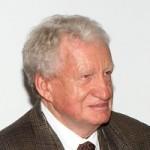
Yves Morneau was raised in a multicultural environment on Saint Urban Street in Montreal. His classical studies prepared him to become a ‘responsible citizen of the world’, first as a missionary with the White Fathers in Zambia, and later as an employee of the Canadian International Development Agency in Tanzania and Benin, accompanied by his wife, Lise.
Reflecting on his 40 years of work in development, mainly in Africa, he concluded that social, political, and economic progress could only happen if tolerance, compassion, and mutual understanding prevailed over class, religion, and ethnicity. Consequently, after retiring from CIDA, he acquired a Master’s degree in Conflict Studies and trained with the Canadian Institute for Conflict Resolution. These studies supplemented four decades of international experience by providing him with practical tools for understanding deep-rooted conflicts and facilitating better relationships among groups and individuals.
Yves Morneau’s Acceptance Speech
Dear Members and Friends of the Civilian Peace Service ,
Before retiring from CIDA in 2004, I had spent some time reviewing what had motivated and interested me most throughout my life. I discovered that they were the moments when I was involved in situations when conflicts had to be resolved. I decided then, to reset my career clock and started the Master program in Conflict Studies, here at Saint Paul University. While studying, I completed also the full training offered by the Canadian Institute for Conflict Resolution.
It was through these programs that I became aware of the Civilian Peace Service and its accreditation process. I decided to apply for it, about a year ago, and I was invited by the organisers to participate in the exercise required. From the very beginning, I became aware of the thorough, extensive and meaningful questioning leading to this evening’s accreditation.
While answering the questions pertaining to core values and key competencies, I was brought back not only to what had motivated me through all the years I spent in Africa and here in Canada but also to what I had achieved in the field of development and peace. It was a great opportunity to talk openly on this subject with people who were able to appreciate and relate to what I was sharing with them. A rare opportunity in anyone’s life !
This accreditation process is only a beginning in the life of a person wanting to become a peace professional. What it has done for me was to clarify in myself who I am and to give me a sense of my own worth. But don’t get me wrong, I still have a lot to achieve in order to become a real peace professional. At least the process is showing me the way forward and that peace has to be strongly established within yourself first .
What is the future of Peace as a profession?
Would Peace as a profession be only in its infancy? Though there has always been people who have worked towards peace, many at the cost of their own lives, it would appear that Peace as a profession requires a well-structured approach:
- having a good understanding of deep-rooted conflicts and their history;
- having a good expertise in mediation and facilitation;
- working closely with like-minded people who are willing to spend time and consideration on sensitive issues;
- networking with other groups to create a constituency for actions towards peace.
An example that this is possible is that the 2008 Nobel Peace Prize was awarded to Martti Ahtisaari, for his important effort, on several continents, and over more than three decades, to resolve international conflicts, a true Peace Professional. Very few people have probably heard his name mentioned before.
For the past few months, I have worked in close communication with a Congolese University Professor at the Bukavu Catholic University, in South Kivu, in the Democratic Republic of Congo. I had heard that his bishop had asked him to start a Peace Institute for the Great Lake Region within the University. Through e-mails, we exchanged some ideas and documents.
Even before I communicated with him, he had dreamt of creating Foyers de Paix. (Households for Peace). Working with him to achieve this concrete goal, and providing him with advice and encouragement, the Foyers de Paix are now being implemented in Bukavu and in Ruhengeri (Rwanda). These Households for peace are at village level where people of different ethnic groups are to work together towards reconciliation in learning different trades.
He has recently written the statutes of this organization which have just been officially recognized. He has secured the support of a local Trade Training School and will hold a seminar for the first time December 2 to 6th with 50 people, young and old thus creating a space for dialogue. Here, I believe, is another true Peace Professional in action.
I would like to thank the Board of the Civilian Peace Service for granting me this accreditation as one of the first peace professionals. Thank you also to the Examiners, my new Colleague Ben Hoffman and the many friends who came this evening to witness this moment.
